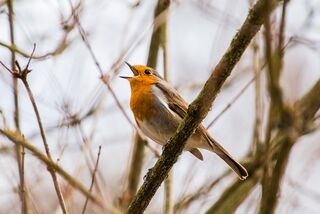Social Networking
It Turns Out Tweets Are Good for You
And no, we’re not talking about social media.
Posted November 7, 2022 Reviewed by Vanessa Lancaster
Key points
- A recent study shows that birdsong is beneficial to our mental health.
- Birds can increase well-being in the general population and people with mental health issues.
- A lift in mood lasts long after you've finished listening to birdsong.

At first glance, you’d be forgiven for thinking that this article was all about Elon Musk, his recent takeover of Twitter, and what that might mean for our mental health and well-being. But no.
Instead, I am writing about a more natural kind of tweet. Namely, birdsong, which studies have shown is very beneficial for our mood.
The recent study, led by academics from King’s College London, found that hanging out with birds improved not only the moods of people with depression but also the moods of the wider population at large (i.e., pretty much everybody).1
The two-week study involved participants from the UK, Europe, the U.S., Australia, and China, so it’s pretty safe to assume that birdsong is of a cross-cultural benefit.
The study, published in Scientific Reports, tracked 1,292 participants over a two-week period via an app called Urban Mind. It prompted them, at random intervals, to record how they were feeling, including whether they felt happy or stressed and whether or not they could see trees and see and hear birds where they were at the time of the intervention.
Well-being scores improved significantly when people saw or heard birds, with the increase in mood lasting way beyond their avian encounter.
However, while well-being scores also increased if other nice things were present (such as trees, bushes, and other green stuff), the effect on mood did not continue long beyond the intervention if birds were not present during the moment, thus indicating what researchers called “a possible causal link effect of birdlife on mental well-being.”
Professor of early intervention in mental health at King’s College and one of the researchers involved in the project Andrea Mechelli, said, “we need to create and support environments, particularly urban environments, particularly where bird life is a constant feature. To have a healthy population of birds, you also need plants, you also need trees. We need to nurture the whole ecosystem within our cities.”
This ties into an earlier article of mine on the benefits of green and blue space (i.e., nature) on our mental health and well-being.
Basically, we need more of it, not less. The more connected with nature we are, the happier we feel.
Birds and birdsong are so beneficial that doctors are considering them as part of a green prescription program.
Mechelli noted that the positive effect on people with depression was significant because many interventions that are designed to help so-called healthy people don’t work on people with mental health issues.
Take exercise, for instance. This makes everyone feel better, but it’s very hard to motivate a person with depression to engage in that as an activity. “Whereas contact with bird life is something that, perhaps, is feasible,” Mechelli noted.
So, the next time you’re in need of a mood booster, you know what to do. Find a green space, walk around for a bit, or sit yourself down and indulge in a little bit of birdwatching. More importantly, lose yourself in the birdsong around you.
Hopefully, when you do, it will be a bit more Birdhouse in Your Soul and a little less When Doves Cry.
You might even want to tweet about your experience.
References
1. Hammoud, R., Tognin, S., Burgess, L. et al. Smartphone-based ecological momentary assessment reveals mental health benefits of birdlife. Sci Rep 12, 17589 (2022). https://doi.org/10.1038/s41598-022-20207-6. https://www.nature.com/articles/s41598-022-20207-6


